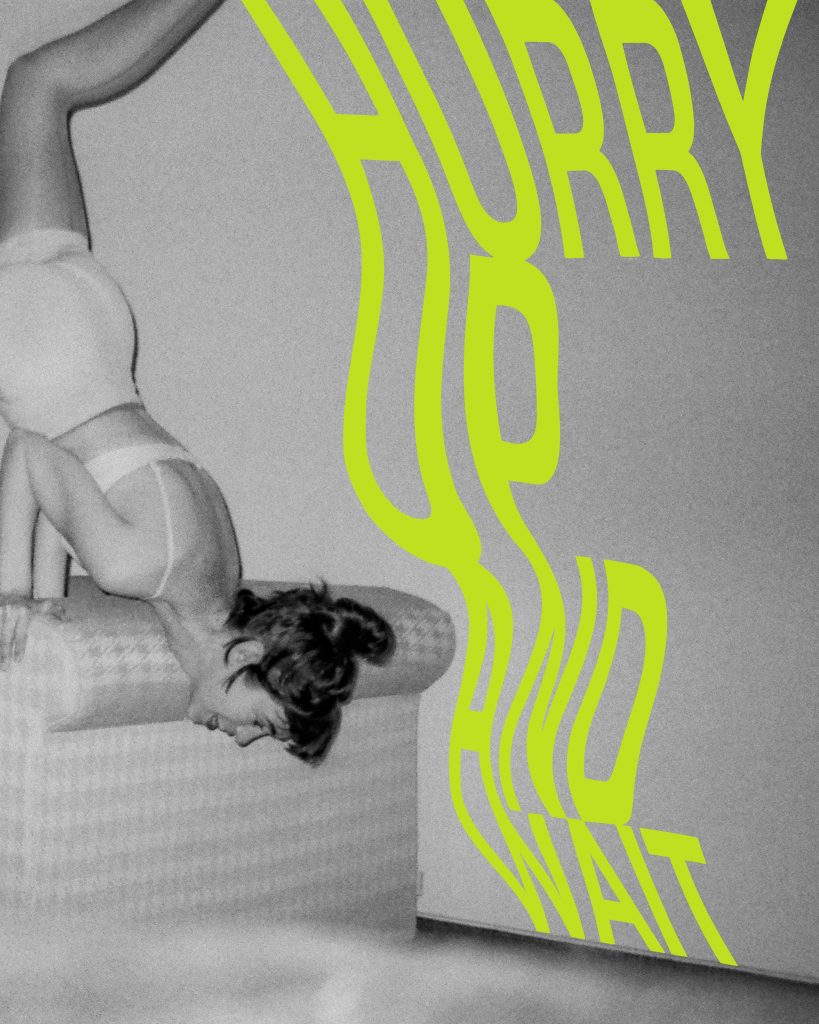In June 2021, the Hungarian ruling party Fidesz under Viktor Orbán passed a law banning the portrayal of homosexuality to minors. This represents an attempt to make queerness invisible in Hungarian public life. At the same time, the German miniseries KaDeWe – Our Time Is Now, was being shot in Budapest. It depicts – among other things – the queer life of the Berlin subculture around 1920.
While experiencing an almost surreal simultaneity of a light-hearted film bubble and a backward-looking socio-political moment, the two leading actresses Lia von Blarer and Valerie Stoll set out to counter the political state of affairs with an artistic and activist voice.
In their book Hurry Up and Wait, the two actresses juxtapose queer fiction with queer reality through photographs and texts. Their analogue photographs taken during the shooting of the series allow us to glimpse the exuberant and restless world of filmmaking, while people from the Hungarian queer community provide insights into their everyday lives by means of poems, short stories, as well as political speeches. They tell us about their attempts to regain freedoms and agency that have been taken away from them by the current government.
EXTRACT FROM THE BOOK:

Foreword
Lia von Blarer & Valerie Stoll
Queer German Fiction vs. Queer Hungarian Reality. Filmmaking also involves emotional ambiguity. Constant time pressure and almost endless waiting mean that actors are continually faced with the moment’s unavailability. They find themselves in an ongoing tension between ‘wanting a lot’ and ‘not wanting anything’. We also experience this situation as EU citizens today. In response to the growth of discriminatory and consequently antidemocratic structures, we want to take swift action. However, democracy is a slow process; on a political level, it is important to think sustainably and on a long-term basis. Hurry Up and Wait links our artistic position as actors with the political situation in the EU. We – Lia von Blarer and Valerie Stoll – portray the two lesbian protagonists in Julia von Heinz’s mini-series KaDeWe – Our Time Is Now. While we were filming in Budapest in the spring of 2021, the Hungarian ruling party Fidesz passed a homophobic law prohibiting the depiction of homosexual love. As a German film crew, we remained largely unaffected. We were allowed to continue filming, but our series would not be shown in Hungary. Queer German fiction was confronted with queer Hungarian reality; our images document a light-hearted film bubble in a backwards-looking socio-political moment. In this publication, this juxtaposition unfolds on two levels: the image’s fiction is faced with the text’s reality. The photographs convey an impression of the boisterous and exhausting world of film-making, showing the restless moments between takes. The texts are written by people from the Hungarian queer community, who describe their reality in poems, political speeches, and their hopes for the future.
The proceeds of this publication will be donated to Budapest Pride. We want to support Hungary’s queer population in reclaiming their agency, which is currently restricted by the ruling Fidesz party.
Set around 1920, KaDeWe – Our Time Is Now tells the love story of Hedi, a KaDeWe employee, and Fritzi, the owner’s daughter. While KaDeWe struggles with out-dated structures, the queer life of Berlin’s subculture flourishes at Club Eldorado.
“This book is something I am very happy about,” says Julia von Heinz in the afterword. “Film today is content. It rushes as zeros and ones through data lines. And as soon as it finishes speeding through, we scour the platforms for new content. This gives films a long lifespan; they undergo various stages of commercialisation and grow in dialogue with their viewers. Opposing the ephemeral nature of content with a book is a fitting approach for KaDeWe – Our Time Is Now. This series is meant to last.
I also appreciate this book because it shows that, in this case, the creative process was just as important as the outcome. We soon felt that. It was always evident that the first major primetime queer series in public television had to come from the queer community: this support was essential and the work would be worthless without this acceptance. As such, a large part of the cast and crew originated from queer backgrounds in Germany and Budapest. This caused conflicts and frictions that showed us on a daily basis how necessary it is still for us to tell this story. Homophobia is not concealed in Hungary. Rather, it is very much part of the official policy. We had many critical incidents while filming. There were moments when they eclipsed my actual work as a director, taking up more space than the filming.
But all this was important for the series. It gave us strength and highlighted the importance of our story. We were constantly reminded why we needed to do this show. And that is why I see it as a great gift that we now have a book recording this process.”

